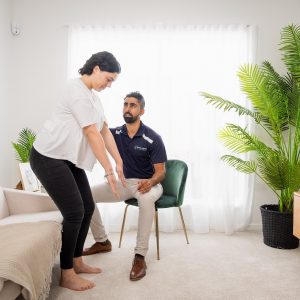Integrating Mobile Allied Health Assistants for Enhanced In-Home Patient Care

Did you know that mobile health solutions are transforming healthcare in Australia, with the market expected to grow exponentially in the coming years? This surge is largely driven by the innovative work of allied health professionals, who are redefining patient care through advanced technology.
Enter Mobile Allied Health Assistants — key players in modern Australian medicine. By leveraging mobile technology, these professionals provide efficient, personalised, and accessible healthcare solutions. Total Rehab Solutions is at the forefront of this revolution, helping to shape the future of health services across the nation.
What is a Mobile Allied Health Assistant?
A Mobile Allied Health Assistant is a healthcare professional who provides essential support services through mobile platforms. They work across various settings, including homes, community centers, and remote areas, to deliver therapy, rehabilitation, and other health services. Their role is critical in ensuring patients receive consistent, high-quality care regardless of location, bridging the gap between traditional healthcare facilities and the patient’s environment.
Allied health professionals have long been the backbone of healthcare, offering specialised services that complement primary and acute care. Traditionally, these professionals worked in fixed locations like hospitals and clinics. However, with the advent of mobile technology, their roles have expanded beyond these walls. Mobile solutions have empowered allied health assistants to provide timely interventions and follow-ups, enhance patient engagement, and improve health outcomes. This technological shift has not only increased their reach but also their impact on patient care, making healthcare more accessible and efficient across Australia.
The benefits of Mobile Allied Health Assistants include:
- Improved Patient Care
Mobile Allied Health Assistants significantly enhance patient care by making healthcare services more accessible and personalised. They ensure that patients receive the necessary support and treatment right in their homes or community settings, reducing the need for frequent hospital visits. This approach not only improves patient comfort but also allows for more personalised care plans tailored to individual needs. By closely monitoring patients in their own environments, these assistants can identify and address issues more promptly, leading to better health outcomes. - Efficiency and Convenience
The integration of mobile solutions in healthcare delivery has revolutionised the way services are provided. Mobile Allied Health Assistants can quickly access patient records, schedule appointments, and conduct follow-ups using mobile platforms, streamlining the entire process. For healthcare providers, this means reduced administrative burdens and more time to focus on patient care. For patients, it translates to the convenience of receiving care without the need to travel long distances, wait in clinics, or disrupt their daily routines. - Cost-Effectiveness
One of the most compelling advantages of Mobile Allied Health Assistants is their cost-effectiveness. By minimising the need for physical infrastructure and reducing hospital readmissions, these mobile services can significantly cut healthcare costs. Patients save on travel expenses and time, while healthcare systems benefit from more efficient resource allocation. Moreover, early interventions and continuous monitoring help prevent complications, ultimately reducing the overall cost of care. This cost efficiency makes mobile allied health services an attractive option for both healthcare providers and patients, contributing to a more sustainable healthcare system.
How to Implement Mobile Allied Health Assistants for In-Home Patient Care
In the evolving landscape of healthcare, mobile allied health assistants are revolutionising in-home patient care by offering advanced, accessible, and personalised support. Here are some steps you can take to ensure an efficient implementation of mobile allied healthcare.
- Evaluate Your Patient’s Needs:
- Assess the specific needs of your patients who would benefit from in-home allied health services. Identify conditions or situations where mobile assistance would be most effective.
- Select Suitable Solutions:
- Research and choose mobile allied health assistant solutions designed for in-home use. Consider features such as remote monitoring, telehealth capabilities, and compatibility with home-based medical equipment.
- Develop an Implementation Plan:
- Outline a plan for integrating mobile solutions into your in-home care process. Include steps for patient onboarding, staff training, and the setup of necessary technology.
- Train Healthcare Providers:
- Train your team on how to use mobile solutions effectively in a home setting. This should include technical training and guidelines for interacting with patients in their homes.
- Conduct a Pilot Program:
- Start with a pilot program to test the mobile solution in a few homes. Collect feedback from both patients and healthcare providers to identify any issues and make necessary adjustments.
- Roll Out the Solution:
- After a successful pilot, implement the mobile allied health assistants across your patient base. Ensure that all patients and staff are fully prepared for the transition.
- Monitor and Adjust:
- Continuously monitor the performance of the mobile solutions and gather feedback from patients and providers. Make adjustments as needed to improve the service.
- Continuously monitor the performance of the mobile solutions and gather feedback from patients and providers. Make adjustments as needed to improve the service.
- Ensure Compliance and Security:
- Ensure that the mobile solutions comply with healthcare regulations and maintain high standards of data security and patient privacy.
Implementing mobile allied health assistants for in-home patient care can enhance the accessibility and quality of healthcare services. By following a structured implementation process and adhering to best practices, you can successfully integrate these solutions into your practice.
Ready to enhance your in-home patient care with mobile allied health assistants? Get in touch with us today to learn more about how our solutions can benefit your practice. Call us at 1300 685 046 or email us at admin@totalrehabsolutions.com.au for a consultation and discover the difference we can make together.

